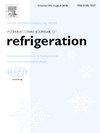Design and optimization of a novel hybrid ejector-based refrigeration system for enhanced energy and cost efficiency
IF 3.5
2区 工程技术
Q1 ENGINEERING, MECHANICAL
International Journal of Refrigeration-revue Internationale Du Froid
Pub Date : 2025-04-26
DOI:10.1016/j.ijrefrig.2025.04.023
引用次数: 0
Abstract
This study introduces and investigates a novel hybrid refrigeration system that integrates vapor-vapor ejector refrigeration (VVER) with two-phase liquid-vapor ejector refrigeration (LVER), termed the VVER-LVER cycle. Utilizing environmentally friendly refrigerants—R600a for the VVER cycle and R152a for the LVER cycle—the system demonstrates significant advancements in energy efficiency, economic feasibility, and environmental sustainability. A systematic design methodology is developed to optimize the dimensions of the two-phase ejector based on operational parameters, ensuring enhanced performance and pressure recovery. Through multi-objective genetic algorithm optimization, the study simultaneously maximizes exergy efficiency and minimizes total annual cost, achieving a Pareto-optimal solution with an exergy efficiency of 25.5 %, a total annual cost of $1011.61/year, and a coefficient of performance (COP) of 0.40 for a 5-kW cooling capacity system. Comparative analysis reveals substantial improvements over conventional hybrid ejector-compressor refrigeration cycles, including a 12 % increase in exergy efficiency, a 19 % reduction in annual costs, and an 11 % enhancement in COP. The integration of two-phase LVER and vapor-liquid separator technologies highlights the system's potential to address critical challenges in sustainable cooling applications. This research provides a comprehensive framework for the design, optimization, and evaluation of hybrid ejector-based refrigeration systems, contributing to the advancement of energy-efficient and cost-effective cooling technologies for industrial, commercial, and transportation applications.
一种新型混合喷射器制冷系统的设计和优化,以提高能源和成本效率
本研究介绍并研究了一种新型的混合制冷系统,该系统将蒸汽-蒸汽喷射器制冷(VVER)与两相液体-蒸汽喷射器制冷(LVER)相结合,称为VVER-LVER循环。采用环保型制冷剂——VVER循环使用r600a, LVER循环使用R152a——该系统在能源效率、经济可行性和环境可持续性方面取得了显著进步。开发了一种系统的设计方法,根据操作参数优化两相喷射器的尺寸,确保提高性能和压力恢复。通过多目标遗传算法优化,实现了火用效率最大化和年总成本最小化的同时,实现了5 kw制冷量系统的火用效率为25.5%,年总成本为1011.61美元/年,性能系数(COP)为0.40的pareto最优解。对比分析表明,与传统的喷射-压缩机混合制冷循环相比,该循环有了实质性的改进,包括能源效率提高12%,年成本降低19%,COP提高11%。两相LVER和汽液分离技术的集成凸显了该系统在解决可持续冷却应用中的关键挑战方面的潜力。本研究为基于混合喷射器的制冷系统的设计、优化和评估提供了一个全面的框架,为工业、商业和运输应用的节能和成本效益冷却技术的进步做出了贡献。
本文章由计算机程序翻译,如有差异,请以英文原文为准。
求助全文
约1分钟内获得全文
求助全文
来源期刊
CiteScore
7.30
自引率
12.80%
发文量
363
审稿时长
3.7 months
期刊介绍:
The International Journal of Refrigeration is published for the International Institute of Refrigeration (IIR) by Elsevier. It is essential reading for all those wishing to keep abreast of research and industrial news in refrigeration, air conditioning and associated fields. This is particularly important in these times of rapid introduction of alternative refrigerants and the emergence of new technology. The journal has published special issues on alternative refrigerants and novel topics in the field of boiling, condensation, heat pumps, food refrigeration, carbon dioxide, ammonia, hydrocarbons, magnetic refrigeration at room temperature, sorptive cooling, phase change materials and slurries, ejector technology, compressors, and solar cooling.
As well as original research papers the International Journal of Refrigeration also includes review articles, papers presented at IIR conferences, short reports and letters describing preliminary results and experimental details, and letters to the Editor on recent areas of discussion and controversy. Other features include forthcoming events, conference reports and book reviews.
Papers are published in either English or French with the IIR news section in both languages.

 求助内容:
求助内容: 应助结果提醒方式:
应助结果提醒方式:


